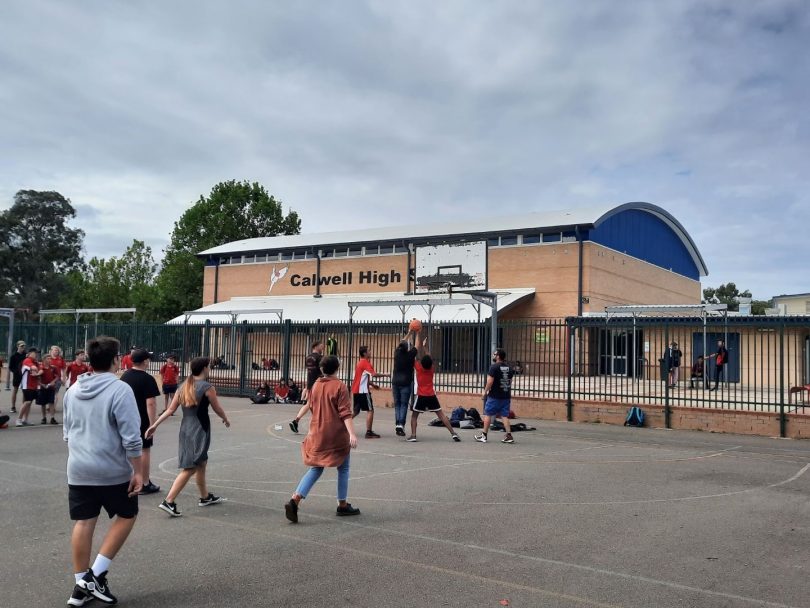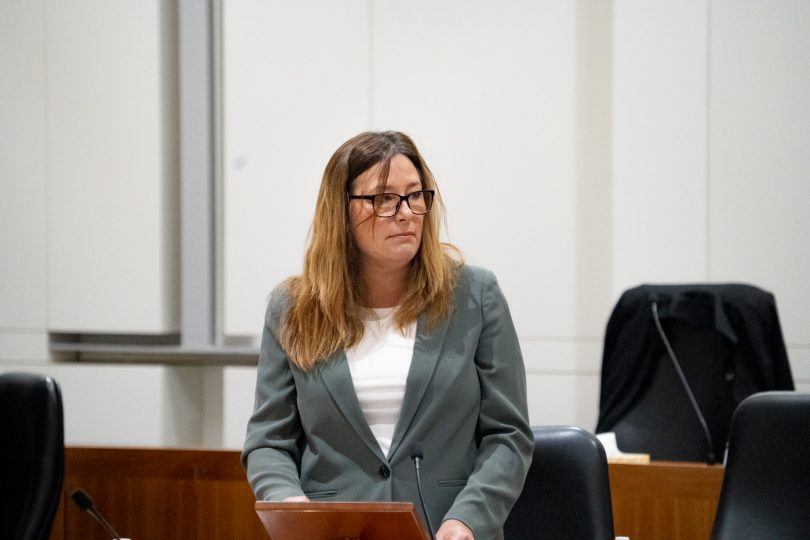
Year 7 and 8 students at Calwell High School were barred from attending school after WorkSafe ACT found an “untenable”, violent and unsafe situation last week. Photo: Calwell High School.
The Education Minister, along with senior officials from the ACT Education Directorate, has defended the government’s approach to resourcing schools, once again arguing they are grappling with a “national teacher shortage” to which the Territory is not immune.
Minister for Education Yvette Berry fronted an Auditor-General’s inquiry committee hearing into teaching quality in ACT schools today (11 April) after a week in which she survived calls for her resignation and a no-confidence motion moved by the Opposition in the Legislative Assembly.
These calls followed a damning WorkSafe ACT prohibition notice which barred a cohort of year seven and eight students from attending Calwell High School after deeming the school to be unsafe for students and teachers.
Critical under-staffing issues at this specific school were revealed as being the tip of an iceberg of problems which included staff being subject to violence, threats and abuse on a daily basis.
On one occasion, a shortage of available staff led to one teacher being required to supervise upwards of 75 students.
The ACT branch of the Australian Education Union subsequently accused the Directorate of failing to uphold its responsibility to adequately resource and staff schools to meet the needs of students.

Minister for Education Yvette Berry said the ACT’s teacher shortage is part of a national problem. Photo: Region Media.
The regulator has now issued an additional three prohibition notices to Calwell High, a spokesperson for the ACT Education Directorate confirmed to Region Media, and at least one other Canberra public school has since been visited by its inspectors.
Ms Berry last week repeatedly rejected claims from the union that violent incidents were widespread across the Territory’s schools and instead said COVID-19 had exacerbated existing staffing challenges.
Several ACT schools turned to partial remote learning in the last few weeks of term as COVID-19-related staffing challenges made normal operations impossible.
ACT Greens MLA Johnathan Davis questioned Directorate officials about whether schools could be provided with additional funding if a particular student cohort was found to likely benefit from additional staffing.
“How much do we assess these instances, like some we’ve seen in the media recently where a school might need … a certain amount of staff but a particular student cohort at a particular time is presenting challenges where a permanent staff member who is not assigned to a classroom may prove valuable?” he asked.
Directorate officials responded in the affirmative saying that schools were funded on a needs basis which included loading for students with needs. Additional support can also be provided through the education support office.
Executive Group Manager of Business Services in the Education Directorate David Matthews said there were a variety of funding models available and schools had the power to determine their own staffing arrangements, including in-built relief as Mr Davis had suggested.
“We’re very confident that each of the principals is working with the education support office to get that mix right,” he said.
Ms Berry added it was important to note that sometimes when additional resources were required at schools, it wasn’t only teachers.
“[The] Directorate works very closely with health and other community support organisations with that in mind,” she said.
“That might be a situation that the school takes advantage of, rather than just the teaching workforce,” Ms Berry said.
But Canberra Liberals MLA Nicole Lawder repeatedly pushed Ms Berry and senior officials from the Education Directorate for responses to questions about what had actually been done to address the ongoing teacher shortages and whether there had been any “measurable improvements or measurable results”.
“Given some recent commentary, it would seem we are struggling,” she said.
Education Directorate director-general Katy Haire said some additional strategies, such as the 453-strong centralised casual relief pool had already been adopted.
Ms Haire acknowledged the past few months had been difficult due to COVID-related absences but said, going forward, they would focus on the “big picture” which related to how a “high-quality workforce [can be secured] into the future”.
Ms Haire said some highlights already achieved included improving the retention of early-career educators.
The directorate took on notice the possibility of providing a progress report on their Workforce Strategy 2021-23.





















